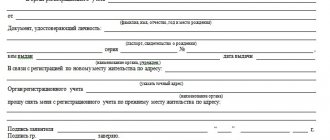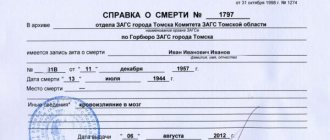The consent of the other members of the tenant's family and the consent of the landlord are not required to move in with the parents of their minor children.
- Moving into residential premises of citizens as members of the tenant's family entails a change in the relevant social tenancy agreement regarding the need to indicate in this agreement a new member of the tenant's family.
- Does the owner have the right to expel a child from his apartment? Can the owner remove a child from the owner’s apartment? The law of the Russian Federation reserves the right of a citizen to dispose of his own property at his own discretion. But in order to complete a transaction for the alienation of real estate, it is necessary to deregister all residents of it. There will be no problems with the removal of adult citizens.
Discharge an adult child from the apartment if he is not the owner
If the father is deprived of parental rights, is serving a sentence in prison, or is declared mentally unstable, there is every reason to expel the child without his permission. What sanctions will follow in the absence of registration After receiving a birth certificate, parents are required to register the child at their place of residence within seven days, i.e. make him permanent or temporary registration. If parents do not intend to register their child, they bear administrative responsibility for violating the law and are required to pay a fine, the amount of which reaches 3.5 thousand.
rub. In this case, the child will be denied access to kindergarten, school, child benefits, and medical services.
Have you decided to remove an adult child from your apartment?
As you know, a child must have registration in the place where his parents live. It is impossible not to have a registration for a child, this is evidenced by Law No. 5242-1 (on the rules for moving citizens around the country), and by the legislation in general. The child must belong to a specific subject and region of our country, this is carefully monitored by the guardianship and trusteeship authority.
Therefore, if you are the new owner of an apartment in which a child was registered with his parents before you, you cannot discharge the minor yourself and through the court due to the fact that his parents do not have any other registration. Thus, the question posed at the beginning of the paragraph (is it possible to discharge a minor child from an apartment to nowhere) can be answered in the negative, however, there are a number of nuances that can help you understand the situation and perhaps find a way out.
Can I discharge an adult son if I am the owner of the apartment?
Many difficult situations may arise in life, due to which parents have to sign their son out of the apartment without his consent. Most often, this happens when a child resists moving to a new place of residence, especially if he is the owner of the home. But also, the child’s discharge may be required if he has already reached the age of majority. If there are no legal grounds for prohibiting the child’s discharge, this procedure can be carried out by following several rules. Is it possible? The court often deals with disputes between children and parents regarding the removal of a son from an apartment without his consent. Most often, the court sides with the child, since the decision is made from the point of view of the law.
Interesting: How to make temporary registration in a privatized apartment
Secondly, you will be required to compensate him for the cost of his share in monetary or other terms. 5 If your son is a minor, then you will not be able to discharge him under any circumstances without the consent of the guardianship and trusteeship authorities. However, if you have the opportunity to buy him and his guardian (including the second parent) living space equivalent to his share (or corresponding to housing registration standards), then you will have the opportunity to discharge your son.
Is it possible to expel an adult son of a non-owner from an apartment?
The owner has the right to discharge a minor without the consent of the guardianship authorities. But if the court reveals facts of infringement of his rights, he can restore him in registration. Therefore, upon discharge, it is necessary to provide and take into account the following nuances:
- Any actions related to the registration of a minor are carried out jointly with parents (legal representatives).
- The right to sign when drawing up documents for children under the age of 14 belongs to their legal representatives.
- A citizen from 14 to 18 years of age prepares documents independently, but in the presence of parents (or guardians).
- If an adult has both a father and a mother, both must give consent to deregistration.
- If a child is registered in the apartment of relatives, and the parents do not agree with his discharge, the issue is resolved through the court.
Procedure
At the same time, with regard to deregistration of an adult son, the mother and father have a number of opportunities to carry out a compulsory procedure. To determine whether adults can cancel their child’s registration without his consent, it is necessary to establish the presence of one of the following conditions:
- if for a long time the child does not live at the registration address, but lives in the personal areas of the second parent (for example, the father has the opportunity to remove his son from the apartment register if he lives separately with his mother, whose living conditions are better than at the place of registration) ;
- if the child is already an adult and has full legal capacity, and also has other alternative places for registration.
This is an exceptional list of features. Also included in a separate category of questions is the algorithm for de-registering a mother and baby together (for example, after a divorce). In this case, there is no question of the child’s consent, and the court will grant the father’s request only if the woman has a place to register in compliance with the proper living conditions for the child.
All controversial situations are resolved only with the involvement of the judiciary, and therefore the interested person prepares a petition to the court, and also collects the necessary documents and evidence. The court makes a decision after the hearing based on material evidence, as well as the testimony of all parties.
How to remove a child from an apartment without parental consent?
- A child under 14 years of age is deregistered only together with one of the parents.
- To deregister, you must have proof that the child will be registered at a different address. Moreover, the conditions at the new place of registration must be no worse than the previous one. For example, you cannot discharge him from a separate apartment to a communal one.
- A separate requirement may be that new housing is located in the same area as the previous one.
- The reason for this requirement is that the child, when moving, has the opportunity to attend the same educational institution as before.
Is it possible to expel a minor child from the owner’s apartment?
- 1 How to discharge a minor child from an apartment
- 2 Discharge a child from a privatized apartment
- 3 If the child is not the owner
- 4 If the child is the owner
- 5 How to discharge an adult child from the owner’s apartment
- 6 Checking someone else's child out of your apartment
- 7 The owner’s right to deregister
- 8 How can I find out if my child has been discharged?
How to expel a minor child from an apartment Is it possible to expel a minor child from one’s own apartment? Of course, such a procedure is possible. It follows from the Housing Code that there is no prohibition on discharging a child.
However, there are certain restrictions that allow you to bypass some rules.
But if your children are endowed with at least some property in this apartment, then unfortunately you will not be able to deprive them of this. Thanks for the answer !
- Only by filing a claim to recognize their right to use as terminated, due to the termination of family relations between you and your daughters, under Art. 31 part 4 of the Housing Code of the Russian Federation. The claim is filed in federal court at the location of the apartment. Article 31 of the RF Housing Code. Rights and obligations of citizens living together with the owner in residential premises owned by him 1. Members of the family of the owner of residential premises include his spouse living together with this owner in residential premises owned by him, as well as the children and parents of this owner. Other relatives, disabled dependents and, in exceptional cases, other citizens may be recognized as members of the owner’s family if they are settled by the owner as members of his family.
| Dear visitors! The site offers standard solutions to problems, but each case is individual and has its own nuances. |
| If you want to find out how to solve your particular problem, call toll-free ext. 504 (consultation free) |
Discharge an adult child from the apartment if he is the owner
Adult children will have a claim to the living space if they are the owners or have inherited the property. How to discharge an adult child from a privatized apartment If a child is born, he cannot claim the property of his parents. Except in cases of registration of donation.
If the child participated in privatization, he has every right to his share of meters of living space and with the discharge he does not lose his legal rights to housing. In addition, even if he lives in another living space, there is no reason to deregister the owner. How to discharge an adult child in this case? You can challenge the transaction, as a result of which part of the property was transferred to him.
How to discharge an adult if he is registered After the termination of family relations, an adult is discharged from the apartment without his consent on a general basis.
How to expel an adult child from an apartment without his consent?
How to check out from a privatized apartment ? Nuances, misconceptions and main points Let's consider the frequently encountered problem of an extract upon divorce. Is it easy to be evicted from an apartment after breaking up a legal relationship?
The solution to this problem cannot be fit into some algorithm. By and large, each case is individual and requires an individual approach. no matter how much one would like to structure cases and solve them according to some already existing rules. How to discharge an adult child from an apartment? According to the law, the property of the parents does not pass to the child at birth. You can only give him an apartment, but rarely does anyone do this, only if circumstances force it. But if the apartment is privatized, and at this time the child lives in it, then he receives the right to a part of it.
Using maternal capital by purchasing housing may also require allocating a share to the child.
On the possibility of his mother expelling his son from the apartment without his consent
The court is one of the bodies that makes decisions on the merits, but does not participate in the collection of evidence, so the obligation to provide documents falls on the shoulders of interested parties. And the final decision of the judge will depend only on the completeness of the package of papers.
Interesting: What documents are needed to obtain a construction permit in SNT from March 1, 2020
In practice, questions often arise as to whether a property owner can deregister a relative or stranger, including whether a mother has the opportunity to sign her son out of her personal apartment without his consent. The procedure for resolving the issue requires an individual approach, since often in such disputes the constitutional right of the property owner to independently dispose of his property and the guarantee of each citizen for social security collide, especially with regard to minor participants in disputes.
Is it possible to expel an adult child from an apartment?
Set of documents If all documents are available, permission is given to discharge the child without the mother’s consent. Documents to the migration service for the discharge of a child without the mother’s consent:
- Received permission from the guardianship authorities.
- Passport of the guardian or other person involved.
- Application for deregistration.
If the child is over fourteen years old, then he fills out the application on his own behalf.
- Documents for housing from which the child is being evicted.
- Departure document.
Within a week, the child will be discharged from one apartment, and then, at the migration service department at the new place of residence, it is necessary to register him in another living space. Form No. 6 is filled out, passports, documents for new housing, and permission from the board of trustees are provided. The registration procedure will be completed in a week.
How to discharge an adult from an apartment Then everything is very simple. You go to the passport office, fill out the appropriate forms and that’s it.
In this case, the discharge of an adult child is carried out on the basis of a change in his place of residence. If you have municipal housing, it is impossible to deregister your adult child without his consent. The only way out in this case is to provide him with housing (buying a room or exchanging existing housing).
How to be discharged from a privatized apartment? Nuances, misconceptions and highlights
The person being discharged goes to the passport office at his place of residence, writes an application, leaves his passport, and a few days later comes to pick it up. His passport will contain a note indicating that he was discharged from his previous place of residence.
But everything turns out to be much more complicated if there is no talk of any voluntary discharge, and when resolving this issue, all parties conflict with each other.
We recommend reading: exemption from alimony
Do I have the right to remove an adult child from the apartment without his consent?
How to discharge adult children from an apartment? Other relatives, disabled dependents and, in exceptional cases, other citizens may be recognized as members of the owner’s family if they are settled by the owner as members of his family. 2. Family members of the owner of a residential premises have the right to use this residential premises on an equal basis with its owner, unless otherwise established by agreement between the owner and members of his family.
Is it possible to expel my ex-husband from the apartment? A minor child has been assigned by the court to the guardianship of his mother (ex-wife), that is, she is his legal representative. The former head of the family is not going to move out of the apartment, he demands to share it, and demands one third for himself (which is impossible, since the apartment is registered for the children).
There is a case of assault on his part. The right of the tenant to move other citizens into the residential premises he occupies under a social tenancy agreement as members of his family
- The tenant, with the written consent of his family members, including temporarily absent family members, has the right to move into the residential premises he occupies under a social tenancy agreement his spouse, his children and parents, or with the written consent of his family members, including temporarily absent members of his family, and the lessor - other citizens as members of his family living with him. The landlord may prohibit the move-in of citizens as family members living with the tenant if, after their move-in, the total area of the relevant residential premises per family member is less than the accounting norm.
How to expel a person from an apartment to the owner
I have the following question: we lived in a civil marriage, bought an apartment and a mortgage, registered it as a common-law wife, and later separated because she was the owner, so she and the child were registered. I paid for the mortgage on her behalf. I have receipts, she’s not here She has been living here for a year, she got married, and her child lives with her. In February 2012, I paid off the mortgage and we formalized the purchase and sale of the apartment. Now I am the owner, it was written in the contract that she undertakes to check out within a month, but she now refuses.
Discharge an adult child
Marina, the fact is that the apartment is already the property of the mother. On the one hand, since you were registered at the time of privatization, you retain a lifelong right of residence, on the other hand, since you do not live and, apparently, do not pay housing and communal services - this is the basis for considering you to have lost the right of residence and discharge through the court. I would recommend that you first go to court with a claim to divide the bills for payment and then pay specifically for your bills; this will protect you from such danger. 12. 4. Irina, hello! From a legal point of view, there is such a possibility. He can “discharge” an adult child without his consent, provided that the child no longer actually lives there, there are no personal belongings in the apartment, he does not pay bills, there is no common household management and no obstacles are created for him to use the premises. In this case, a statement of claim is filed with the district court with payment of a state fee of 300 rubles, and then after a court decision is made in favor of the plaintiff, the plaintiff applies to the passport office with this decision. This is provided that there are no details requiring special attention that you have not reported. 7. 4. Good afternoon! Yes you can. Through the court with a statement of claim for recognition of the loss of the right to use the residential premises and deregistration. Reason: loss of family relationships, living at a different address, failure to pay utility bills, etc. District court, what is your district? The state duty is 300 rubles. The trials will last around 3 months. Call me and I’ll help you prescribe it, I have practice, but you need to know some nuances. 7. 3. If an adult daughter and a child do not live in the apartment without good reason, do not participate in the payment of housing and utility bills, and have another permanent place of residence, then there are grounds for filing a claim with the court for recognition that they have lost or have not acquired the right to use the residential premises with deregistration.
It all depends on the specific circumstances. You need to properly prepare for going to court.
Is it possible to expel an adult from an apartment?
- general civil passports of the plaintiff or several plaintiffs; when acting through a proxy, he will need his passport and a power of attorney from the applicants;
- a document certifying the right to a residential property, namely an extract from the Register or a certificate of ownership;
- an agreement according to which the applicant acquired his rights, including purchase and sale, exchange, equity participation, it can also be a court decision or a certificate of receipt of an inheritance;
- an extract from the house register for this residential premises;
- evidence that is given in the following list;
- check and receipt confirming payment of the state duty.
- testimony of witnesses, in particular neighbors, that the child does not live in this place;
- an act drawn up as a result of an inspection of the apartment by a representative of the housing department or HOA, which will indicate that this employee visited the apartment and did not find the defendant’s belongings, as well as signs that he lives in this premises;
- a similar act from the district police officer;
- response from the local post office stating that the person does not receive mail sent to him at this address
- pre-trial settlement, during which the parties try to come to an agreement without filing a claim; if this fails, the plaintiff moves on to the next stage; it is skipped if the parents do not have contact with the child;
- collecting evidence that may be needed during the consideration of the case;
- drawing up a statement of claim;
- filing an application and evidence in court;
- direct consideration of the case in court during the preliminary and main hearings;
- rendering a verdict;
- if it turns out to be in favor of the plaintiff, then obtaining a copy of the court decision;
- transfer of this document to the Ministry of Internal Affairs;
- If the defendant continues to live in the apartment and does not want to leave, he will be subject to eviction.
- an adult child does not participate in the common household run by the family;
- he does not contribute to the budget, it is his own;
- there is no mutual support between the child and other relatives;
- the defendant does not live in this area and does not contribute a share in the payments for the apartment; this condition is not mandatory, but acts as an additional argument in favor of the required court verdict.
If the son does not agree to be discharged from the residential premises
If consent for the extract has not been received from the son, and he did not appear with his mother at the territorial division of the passport office, the step-by-step instructions for extracting square meters are as follows:
- The owner of the apartment files a statement of claim in court.
- The court employee issues the applicant with documents that must be provided.
- All that remains is to collect these documents and submit them to the court.
- There is no need to come to court to hear cases. The judge makes a decision on such a case without the presence of the applicant. You will learn about the court decision from a letter that will be sent to your residential address.









